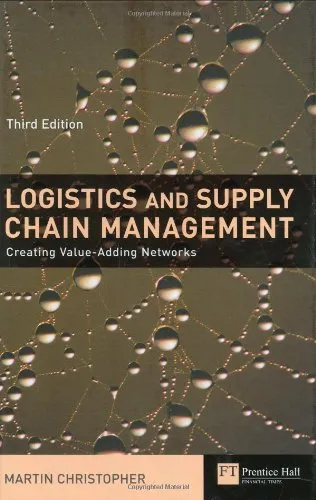Logistics and supply chain management : creating value-added networks
4.3
Reviews from our users

You Can Ask your questions from this book's AI after Login
Each download or ask from book AI costs 2 points. To earn more free points, please visit the Points Guide Page and complete some valuable actions.Related Refrences:
Introduction to "Logistics and Supply Chain Management: Creating Value-Added Networks"
"Logistics and Supply Chain Management: Creating Value-Added Networks" is one of the most comprehensive and insightful guides dedicated to uncovering the art and science of effective supply chain management. Authored by Martin Christopher, this book bridges the gap between theoretical principles and practical applications, offering readers a clear understanding of how supply chains can create competitive advantage and drive business success. Packed with real-world examples, actionable insights, and frameworks for enhancing value, this book remains a cornerstone in its field.
The global business environment is becoming increasingly complex and competitive, and successful companies are those that can optimize their supply chains for efficiency, innovation, and customer satisfaction. Martin Christopher's work underscores the importance of supply chains as interconnected networks designed to deliver value to the end user. By positioning logistics and supply chain management at the heart of strategy, organizations can adapt to changing market dynamics, reduce costs, and differentiate themselves in a crowded marketplace.
This introduction provides an overview of the book’s key topics, its relevance to businesses and professionals, and its groundbreaking approach to creating value-added networks in a rapidly evolving economy.
Detailed Summary of the Book
At its core, "Logistics and Supply Chain Management: Creating Value-Added Networks" is divided into well-structured sections, each dedicated to enhancing the reader's understanding of the strategic role of supply chains in creating value. The book starts by laying down the importance of logistics as a critical element in value creation before delving into the relationship between competitive advantage and supply chain performance.
Key themes covered in the book include:
- The strategic role of supply chain in achieving business objectives.
- Customer focus and how logistics can enhance the customer experience.
- Globalization and the complexities of managing international supply chains.
- Technological advancements and their impact on logistics efficiency.
- Collaboration, partnerships, and relationship management within supply networks.
As the book progresses, Martin Christopher emphasizes adopting a forward-thinking approach, enabling businesses to remain agile in today’s uncertain environments. By integrating challenges such as risk management and sustainability, the book offers solutions to create resilient supply chains. The final sections bring everything together, highlighting innovative strategies for continuous improvement and the role of leadership in driving supply chain excellence.
Key Takeaways
This book delivers numerous valuable insights and actionable advice for professionals, academics, and anyone involved in managing the flow of goods and services. Here are the key takeaways:
- Supply chain management is no longer a support function but a vital element in strategy and competitive positioning.
- Customer-centric supply chains are essential for long-term value creation and improved customer satisfaction.
- Globalization demands a deeper understanding of cultural, regulatory, and infrastructure challenges across international markets.
- Technology, such as data analytics and real-time visibility tools, is transforming how supply chains are managed and optimized.
- Collaborative approaches within supply chain networks can lead to win-win outcomes for all stakeholders.
Famous Quotes from the Book
Martin Christopher’s ability to distill complex concepts into relatable ideas is one of the book's strengths. Here are a few notable quotes:
"The ultimate purpose of supply chain management is to create value for customers and stakeholders."
"In an increasingly global economy, competition is no longer between companies but between supply chains."
"Agility and responsiveness are the new competitive differentiators in supply chain design."
Why This Book Matters
The significance of "Logistics and Supply Chain Management: Creating Value-Added Networks" lies in its timeless relevance and practicality. As global supply chains become more intricate, businesses need a reliable framework to navigate these complexities and turn challenges into opportunities. This book provides that framework, offering up-to-date strategies while emphasizing critical areas like technology, globalization, and sustainability.
This book is essential reading for professionals and business leaders aiming to sharpen their supply chain skills and remain competitive in volatile markets. It also serves as a valuable resource for students and academics seeking a deeper understanding of the discipline. By focusing on customer-centric approaches and end-to-end optimization, Martin Christopher equips readers with tools to adapt, innovate, and lead in the ever-evolving world of supply chain management.
Free Direct Download
You Can Download this book after Login
Accessing books through legal platforms and public libraries not only supports the rights of authors and publishers but also contributes to the sustainability of reading culture. Before downloading, please take a moment to consider these options.
Find this book on other platforms:
WorldCat helps you find books in libraries worldwide.
See ratings, reviews, and discussions on Goodreads.
Find and buy rare or used books on AbeBooks.
1284
بازدید4.3
امتیاز0
نظر98%
رضایتReviews:
4.3
Based on 0 users review
Questions & Answers
Ask questions about this book or help others by answering
No questions yet. Be the first to ask!






![The Ultimate iOS Interview Playbook: Conquer Swift, frameworks, design patterns, and app architecture [Team-IRA]](https://s3.refhub.ir/images/thumb/The_Ultimate_iOS_Interview_Playbook__Conquer__29925.webp)







